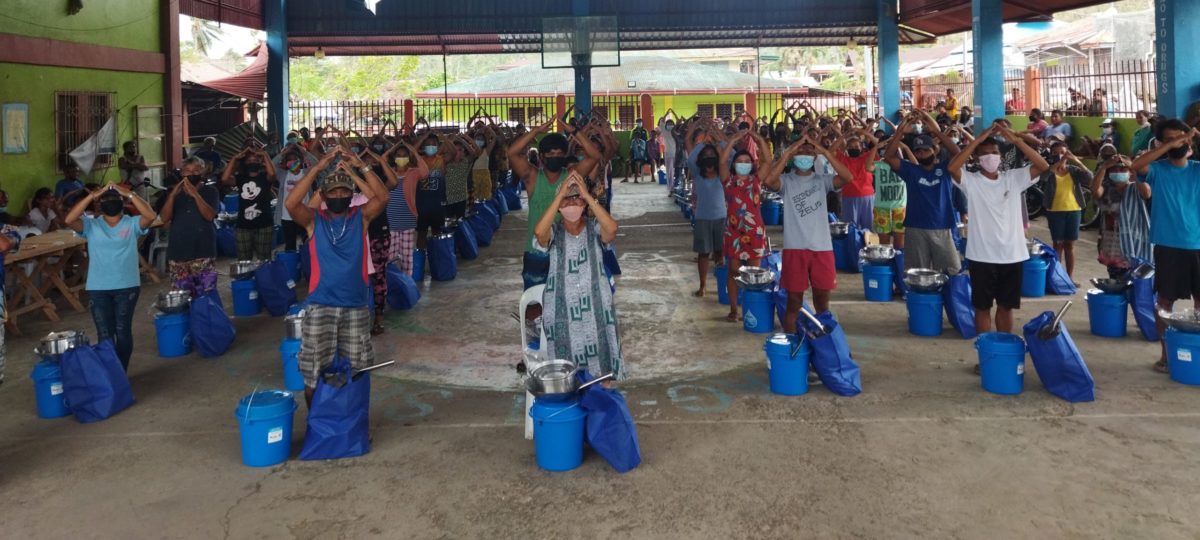
100 Days after Typhoon Odette
Habitat for Humanity Philippines expands relief ops to help rebuild homes
Marking a hundred days after the onslaught of Typhoon Odette, millions of families who lost their homes are still without sufficient shelter assistance to help build back their lives.
In response to the urgent shelter needs of hardest-hit communities, Habitat for Humanity Philippines has widened the reach of its disaster relief efforts to support the recovery and rebuilding of damaged houses in Cebu, Southern Leyte, and Negros Occidental. Supporting nine cities and municipalities, the emergency response program will aid at least 1,800 severely affected, low-income, and vulnerable families through house repair, distribution of shelter repair kits, and provision of hygiene and household kits.
“Habitat Philippines’ teams in the Visayas region are closely coordinating with local government units to assess the urgent shelter requirements of disaster-hit communities. It has been three months and many families are still reeling from the impact of the typhoon. Although PHP 1.6-billion worth of assistance has been provided, shelter assistance only accounts for less than 10 percent. The reconstruction of homes and community infrastructures has been sluggish forcing millions of families to live in unsafe shelter conditions. With the loss of their livelihood and the prolonged impact of the COVID-19 pandemic, they are unable to build back better and safer. The lack of shelter assistance slows down their recovery,” said Habitat Philippines chief executive officer Mardi Mapa-Suplido.
Typhoon Odette (International Name: Rai), one of the world’s strongest tropical cyclones in 2021 that struck the Philippines last December 16, damaged more than 2 million homes, based on the situation report from the National Disaster Risk Reduction and Management Council as of February 21, 2022. Compared to Typhoon Yolanda in 2013 which damaged over 1.1 million houses, Typhoon Odette destroyed 78 percent more, displacing over 115,000 individuals three months on.
“Days after the typhoon happened, we launched our emergency response fundraising campaign, bringing together corporate partners, grant funding organizations, and individuals to support the needs of the affected families. However, unlike in the Typhoon Yolanda response, the flow of local and international aid for Typhoon Odette is slow and meager,” said Lala Baldelovar, chief development officer of Habitat Philippines. “The impact of the pandemic on the local and global economy, coupled with the increasing intensity and frequency of disasters in the past years, contributed to the slower aid for Typhoon Odette.”
Through partnerships and collaborations, several donors heeded the call for support and have committed PHP 45-million worth of assistance for the families that Habitat Philippines targets to help. With this commitment, Habitat Philippines intends to repair the homes of over 1,000 families in Southern Leyte, Cebu, and Negros Occidental. Shelter repair assistance includes damage assessment, ‘build back safer’ orientation, provision of tools and materials, and labor support.
“Today, many communities have not yet fully recovered from the effects and devastation of Typhoon Odette. Together with Habitat for Humanity, Shang Properties thru Kerry Foundation Phils is committed to take part in this humanitarian cause to help affected Visayan communities rebuild their homes and provide safe shelters for these displaced families,” remarked Wilfred Woo, executive director of Shang Properties Inc, one of the major donors for Habitat Philippines’ Typhoon Odette Disaster Response.
Mayor Hermenegildo Culpa of Padre Burgos, Southern Leyte, also expressed their gratitude and appreciation to the organization and its partners for extending aid to the affected families in their municipality. He said in a statement, “The presence and support of Habitat for Humanity Philippines in the municipality is deemed to be a great intervention and aid to the local government unit in giving compassionate assistance to vulnerable affected family beneficiaries in building back their respective shelters better and resilient condition.”
Partnering with local government units and leveraging on the resources and capacity of other community development organizations, Habitat Philippines has distributed hygiene and household kits to 800 families in Southern Leyte and Cebu.
“Through our collaboration with Habitat Philippines, the local government, and the community volunteers, we were able to deliver essential household items to typhoon-affected families as they struggle to pick up the pieces of their lives. The assistance and our presence in the communities also brought a message of hope and solidarity that they are not forgotten and that we are with them in rebuilding their lives,” said Sindhy Obias, executive director of the Assistance and Cooperation for Community Resilience and Development, Inc., which helped distribute the kits in Saint Bernard, Southern Leyte.
“Our partnership with Habitat for Humanity in the Typhoon Odette emergency response has given back joy, value, and dignity to the families, who received the household kits and hygiene kits. Amidst the crisis brought by Typhoon Odette, there are institutions and organizations that are willing to help them rise once again and move forward in their journey,” said Fr. Alden John Baran, program director of Cebu Caritas, Inc., which mobilized the relief operations in Carcar, Cebu.
Following the Pathways to Permanence strategy, Habitat for Humanity Philippines targets to help address the vulnerabilities and long-term recovery of disaster-affected families through permanent houses and resettlement of families living in danger and no-build zones. Habitat Philippines continues to coordinate with LGUs to help develop comprehensive plans for permanent, adequate, and safer settlements for affected families and build sustainable, disaster-resilient communities.
